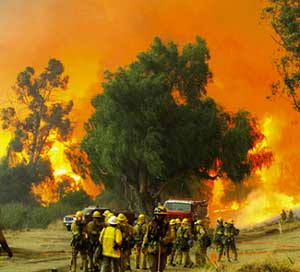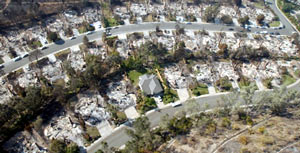FCNNEWSSOURCE
Could cost state up to 12 billion dollars
- Harrowing Fire Evacuation Stories (Black Voice News, California)
- Black Families Suffer Losses In California Fires (Sacramento Observer)

(FinalCall.com) – In a matter of days, major California wildfires had burned more than 743,000 acres, caused 20 deaths and destroyed some 3,570 homes according to the U.S. Fire Service and the California Department of Forestry and Fire. President George W. Bush declared a disaster area in the four counties hardest hit by the fires. State officials have estimated the fires will take a two billion dollar toll on the California economy.
“Everything we’ve worked for 37 years is gone,” lamented a distraught resident in Big Bear Lake, California, whose home was among the 850 destroyed in the area. She was one of the few who were being allowed to return to their fire-ravaged neighborhood and many are finding little left to salvage. The wildfires caused no major damage to bridges, roadways and other infrastructures.
Economists say they have not yet been able to put a price tag on the disaster, however, Steve Westley, state controller and California’s chief auditor, said the total cost of the fires could reach $12 billion. Analysts are predicting a major impact on the state budget as legislators struggle with the massive cost of fighting the fires.
According to news reports, the federal government has agreed to reimburse California for up to 75 percent for the cost of battling the blazes. Usually state and local governments split revenue costs 75/25, but Governor Gray Davis pledged to reimburse the full costs to the local governments.
In the meantime, politicians are busy pointing the finger at each other. Governor Davis said the feds were to blame for the rapid spread of the blazes because they would not give California the money requested to deal with its beetle problem. Homeland Security Director Tom Ridge told reporters, while visiting the devastated areas, it was not the time to play the blame game. Some local officials said that the governor had been ignoring their recent pleas for help concerning the beetle infestation.
But others are warning that, while the recent fires are one of the deadliest and costliest disasters in California history, it could get worse in the future because of the large numbers of pine trees killed by drought and beetle infestation in the San Bernardino National Forest.
“The next fire would be one of Biblical proportions,” warned Andrea Tuttle, director of the state Department of Forestry and Fire. “It’s going to be the most intense fire that we have ever seen,” she added.
The economic forecasters, however, have center stage for now. They say the Southern California fires have a mixed economic impact such as slowing down profit margins in rural playgrounds like Lake Armistead and Big Bear, but causing a temporary bump in the construction industry as houses are rebuilt. Other industries that may benefit from this tragedy, according to economists, are building supply stores and stores that sell home furnishings. Economists also say that insurance claims generated by the fires could exceed the $1.7 billion paid out after the 1991 Oakline Hill fires in California.
But, Stephen Levy, director of the Center for the Continuing Study of the California Economy located in Palo Alto, California, says that analysts are reading more into the economic issues rising from the fires then is necessary. Mr. Levy said the economic bill from the fires pales in comparison to losses stemming from the strikes by grocery clerks and transit workers in Southern California.
“The 500,000 people who were late to work or delayed in Los Angeles County because of the transit strike has got to be more damaging,” Mr. Levy said. Speaking of the wildfires he said, “It’s a human tragedy, not so much an economic tragedy.”
Activists say that these fires are not about million-dollar homes in the California mountains–these fires are about the lives of ordinary people, the most vulnerable–the elderly who have lived for 50 years in the same house, they are about young couples in their first homes, and children who have lost their sense of safety and security.
Analysts said that the fires forced the evacuation of 95,000 people. The fires did destroy million-dollar estates along with vacation homes, but it also destroyed shacks, cabins and trailers.

Census data shows that, in San Bernardino, 32 percent of the population receives some type of welfare assistance. The Federal Emergency Management Agency (FEMA) in the footnotes to their statistical report covering their operations in Southern California note that the fires were likely to have a significant impact on uninsured minority communities such as the three Native American nations–the Rineo, San Pasqual and Barona–who lost 107 residences. FEMA reports that 3,424 people have sought shelter, while 133,000 were without power due to the fires.
However, while politicians were busy pointing fingers and activists and analysts searched for the social factors, there were some who sought answers in the spiritual realm as to why so much damage had happened in one area over a 10-day period.
John C. Raines, chairman of the Religion Department of Temple University, writing on the wildfire disaster questioned society’s apathy towards nature. “We have entered a time of darkness in earth history. Those who know the ravages, which we humans, especially we “developed” humans, have loosed upon our fundamental life systems–the water, the air, the atmosphere, other species–sit in darkness.”
A journalist who writes for the Christian Science Monitor, and lives in the fire-ravaged area, wrote in an article “Prayer and the California fires,” “God is in control. No matter how things may look, I’m doing more good, I remind myself, to acknowledge the message from God that He is in control.”
The writer then quoted the Monitor founder, Mary Baker Eddy, who wrote, “Holy inspiration has created a state of mind which has been able to nullify the action of the flames.”
But the Honorable Minister Louis Farrakhan in a speech on October 4, in Jackson, Mississippi during his address to the ndaba, the Great Sit-Down II, said that unless America changed its ways in its treatment of Black people, the fires would continue. He told the gathering of a letter he had written to Pres. Bush concerning his actions in the Middle East.
“I told Pres. Bush, you’re destroying those cities, but watch out for your own because natural disasters will be coming–calamity after calamity–to destroy your cities and towns,” Minister Farrakhan said.
“And along came [hurricane] Isabel, Kate, David and Issac. I don’t know whose next, you’re not going to have no peace in America–none,” Minister Farrakhan warned. In a compassionate tone, he told his audience that Allah (God) wanted them out of the way of His Wrath because He was not forgiving America for what she has done to Black people and the world. “America has to pay for what she has done to us and the whole world,” he explained.
“The four great judgments that Almighty Allah (God) is bringing upon America are rain, hail, snow and earthquakes. We see them now covering all sides of America, as the Holy Qur’an prophesies, curtailing her on all sides. And this judgment would push the people into the center of the country, and they would realize that it is Allah (God) who is bringing them and their country to naught,” wrote the Honorable Elijah Muhammad in his book, “The Fall Of America.”












